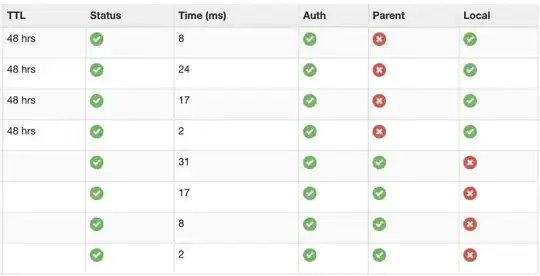I have a hosted zone created in Route53 and updated the NS records under the namespaces of the purchased domain.
Unfortunately the DNS check does not return or point to the new NS records instead gets resolved to old/ previously existing records.
I waited more than 72 hours and still i get "This site can’t be reached"failing with error DNS_PROBE_FINISHED_NXDOMAIN in the browser.
Below is a screenshot from the DNS check provided by https://mxtoolbox.com/,
It shows that the old NS records (First 4 rows with TTL to 48 hours) are present in the Parent and not in local whereas the newly updated records (The last 4 records) are present in the parent and not in the local.
Ping to the domain fails with Unknown host.
Request you to kindly suggest me with the next steps.
